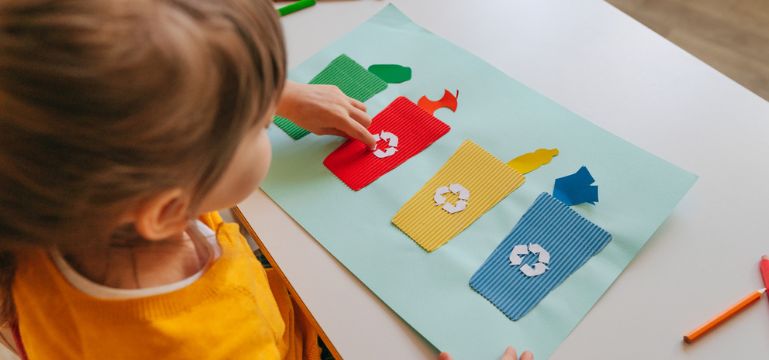Developing a Creative Curriculum

Quick links:
Information about school/provider
Y Bont Faen is a one form entry, English-medium primary school situated in the town of Cowbridge in the Vale of Glamorgan.
Context and background to the effective or innovative practice
The design and development of a bespoke inquiry-based curriculum have been at the heart of professional learning at Y Bont Faen Primary School since the introduction of the Curriculum for Wales. Creativity has been a driving force of the school’s curriculum design to ensure that pupils experience and develop a wealth of creative skills based on the Creative Habits of Mind Wheel (Spencer, Lucas & Claxton, 2012).
To help pupils develop as creative thinkers with a high level of skills in the creative arts, the school has successfully engaged in three successive years of the Arts Council for Wales Lead Creative School Scheme. Whilst the focus of each project has been different, the intention to develop, implement and refine creative pedagogy as a whole staff has remained the focal point of the school’s professional learning and has been a school improvement priority.
As part of improving pupils’ creative skills, the school focused on evidence-informed professional learning for all staff on metacognition and self-regulation. This approach supported the school to develop a common language that staff and pupils use to talk about their learning, and the use of common tools and strategies to make thinking visible. For example, the use of thinking frames across the school supports pupils to be aware of their thinking processes, talk about their learning and ask reflective questions.
Description of the nature of strategy or activity identified as effective or innovative practice.
At the start of the curriculum design process the school established that creativity in all forms should underpin its ‘Inspire Curriculum’. At this point, the school explored opportunities to build on the wealth of creative skills amongst the staff and sought opportunities for further professional learning, such as engaging with The Lead Creative School scheme and developing staff skills in improving pupils’ ability as independent and self-aware learners. One of the strengths of the curriculum design process is the whole school planning of class inquiries under three umbrella topics using cluster created progression documents. These planning days were the first steps in developing a curriculum that ensures knowledge and skills develop sequentially.
Through whole-school planning of termly inquiries, teachers have developed learning experiences that develop pupils’ knowledge of Welsh culture, arts and heritage and pupils’ understanding of diversity across the globe.
The Lead Creative School Scheme enabled all members of staff to work with a creative practitioner, develop their skills, and fostering a creative approach to teaching skills and knowledge across the curriculum. This has been further developed through whole school training sessions related to the dispositions of the Arts Council for Wales, ‘Creative Habits of Mind Wheel’. These training sessions also enabled staff to develop skills relating to each project, for example screen printing, felting, environmental art, drama, song writing and filmmaking. For example, pupils in Year 2 worked with a textile artist to develop their literacy and oracy skills, whilst also improving their well-being, raising awareness of bullying and exploring the schools anti-bullying message. This was showcased in a gallery in Cardiff Bay for a number of weeks.
To support pupils in becoming independent and ambitious learners, the school developed challenge areas for pupils in Year 3 to Year 6. These areas enable pupils to apply their thinking and creative skills in different contexts. For example, creating ‘what if….’ questions, designing and constructing products from different materials and writing imaginatively using different stimuli. These activities impact beneficially on pupils’ skills, knowledge and understanding.
What impact has this work had on provision and learner’s standards?
As a result of these initiatives, pupils present themselves confidently and expressively in a range of situations and to different audiences. Older pupils often speak eloquently using complex vocabulary and sophisticated language with a high level of confidence. Pupils collaborate effectively in a range of situations, such as through play and when choreographing and performing dance routines. As a result of a wide range of stimulating experiences, many pupils produce high quality and imaginative work in art, dance and writing, including when using the outdoor environment. Developing a strong pupil voice has enabled pupils to make independent, creative and varied choices in the way they present their learning. Pupils understand and value the creative process and draw on a range of techniques to refine their learning. As part of the inquiry process, pupils develop and deepen their critical thinking skills, applying these to authentic real life learning experiences where they make useful decisions about their learning. These experiences support pupils in becoming resilient learners who apply problem-solving strategies confidently.
How have you shared good practice?
Good practice has been shared through a number of ways. The members of staff driving the Lead Creative School Scheme presented the outcome of the projects in an Arts Council for Wales sharing event. The school’s work on developing pupils’ thinking skills has been in collaboration with two other cluster schools. This has provided valuable opportunities to share, enhance and embed good practice within our school and amongst the cluster.